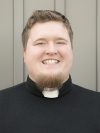Many believers are naturally curious about death and what comes after. This curiosity often appears in the context of funerals and hospitals, yet it also arises naturally throughout one’s life. Pastors and, to some extent, all of us must comfort believers and nonbelievers alike with God’s promise of eternal life. But what does eternal life look like? And when do we experience it?
As Lutherans, we affirm the Apostles’ Creed that says we “believe in … the resurrection of the body and the life everlasting.” In the Nicene Creed we affirm that we believe in the “resurrection of the dead and the life of the world to come.” Simply put, we believe that what happened to Jesus on Easter Sunday will happen to us as well. When Jesus returns in his Second Coming, we will be raised with what Paul calls “spiritual bodies” (1 Corinthians 15:44). Many believers are comforted by this knowledge. But this hope can also seem distant, leaving many to wonder what exactly happens to the righteous dead in the meantime.
Throughout the Bible we find evidence that those who die are immediately conscious and living in the presence of God and the saints. This is because our relationship with God is an eternal one. God is God of the living, not the dead. All are alive to God (Luke 20:38). Paul says that “we would rather be away from the body and at home with the Lord” (2 Corinthians 5:8). Later he confides that when he dies, he will “depart and be with Christ” (Philippians 1:23).
Jesus promises the thief on the cross, “Today, you will be with me in paradise” (Luke 23:43) and tells Martha that those who believe in him will “never die” (John 11:26). In Jesus’ parable of the rich man and Lazarus, both men are immediately conscious after death, the former in Hades and the latter at Abraham’s side (Luke 16:19-31). In Revelation the righteous dead, exposed under the altar of heaven when John breaks the fourth seal, ask God to redeem the world (6:9). From these passages, among many others, we may conclude that, upon death, believers are fully conscious and immediately welcomed into Christ’s presence.
What makes near-death experiences astounding is the heightened mental functioning reported by these individuals while their brains are critically impaired, as one might see during cardiac arrest.
To minister to people who are dying, we must understand recent advances in the scientific understanding of death and consciousness. Researchers such as Bruce Greyson, professor emeritus of psychiatry and neurobehavioral sciences at University of Virginia School of Medicine, and Sam Parnia, an associate professor at NYU Grossman School of Medicine in New York City, show that human consciousness continues after death.
Their work reveals that many individuals accurately report events occurring while they are in a state of clinical death, events taking place in the hospital or at a distance, outside the normal range of perception. There are also patients who, while clinically dead, encounter recently deceased friends or relatives whose deaths they were previously unaware of. What makes these events astounding is the heightened mental functioning reported by these individuals while their brains are critically impaired, as one might see during cardiac arrest.
Recorded and studied in medical journals, these events are beginning to prove what our ancient ancestors in the faith have long taught—that consciousness continues after we die. How this happens, we don’t know. Christians often use the word “soul” or “spirit” to describe this state of being. I prefer, like Paul, to stick with personal pronouns. We will be with Christ, conscious and surrounded by his love, immediately after death.
This may seem like a simplistic understanding of the afterlife—when we die, we go to be with God in “paradise,” where we wait until Christ returns at his Second Coming to resurrect the dead. Yet our language is fundamentally limited by time and space as we currently experience them. For the dead, time and space may be radically changed. Time and space may work differently in God’s presence than they do here on earth.
If we trust in this promise, that the dead are with God and somehow awaiting the resurrection, then we can trust the church’s intuition that there is a connection between the living and the dead.
How we make sense of all this matters less than the trust we place in the promises of God. We can speculate about the sensations of heaven, but the Bible repeatedly avoids this. The Bible doesn’t focus on the how, when or where. Rather it turns our attention to the who—that who being God. This is because our hope for eternal life rests entirely on our relationship with God. The Bible primarily describes heaven not so much as a place but as a state of being in which we will unite with God and one another.
If we trust in this promise, that the dead are with God and somehow awaiting the resurrection, then we can trust the church’s intuition that there is a connection between the living and the dead (Hebrews 12:1-2). We might not be able to make sense of it, but we can trust that we aren’t alone, for all the saints are with us in worshiping our Savior and Sustainer. This also helps make sense of stories I hear in my parish and in my family—stories of the deceased visiting the living, stories of experiencing the presence of the departed, stories of knowing for certain that the departed are with God. We may also trust the Lutheran teaching that when we receive communion, heaven and earth are joined in God’s presence and all the saints, on earth and in heaven, are gathered together around the throne.
We can hold on to these stories and teachings while, at the same time, we trust that Christ keeps the righteous dead by his side. Our ultimate hope is in Christ. This is the truth we need when we go about living our daily lives. We do not have Christ only in this life; instead, we have Christ for all eternity. What could possibly be better than that?
I want to be clear: nothing can separate us from God’s love, not even death (Romans 8:38-39). I pray that you will hold on to this hope with your entire being, because the promise of eternal life liberates us from the fear of death, freeing us to sacrifice our own time and resources to serve our neighbors and glorify God.





